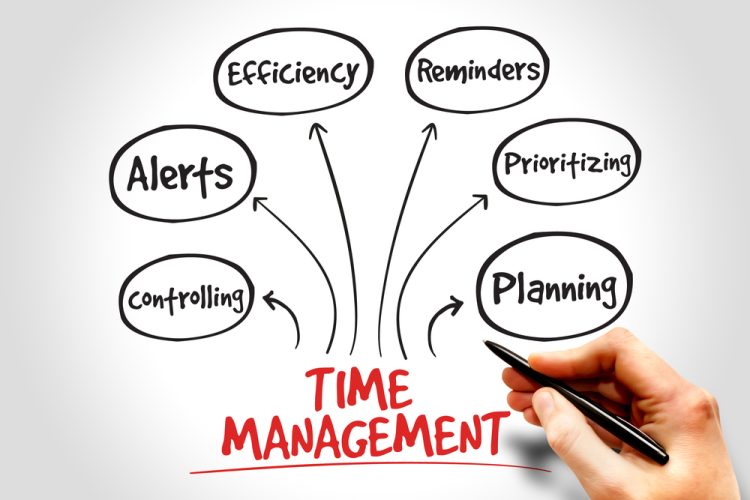One day gives the same 24 hours for everyone– so why do some people seem to achieve more in their time than others? The answer lies in good time management, which describes the ability to “work smarter, not harder”, meaning to achieve better results in less time with less effort. What makes a good time management and why is it important for the workplace and everyday life?
Time management refers to managing time effectively so that the right time is allocated to the right activity. It is not only allocating the right amount of time to each activity, but also knowing which work should be done earlier and which can be done a little later. Much more than a capability, time management is a vital soft skill more relevant than ever in the fast-paced business world, including the shipping everyday reality that requires efficiency and timely problem-solving.
What makes a good time management?
Planning: Planning your working day in advance and setting respective goals for the day can help you remain committed and productive. Complete pending tasks one by one. To-Do Lists are tangible tools that can help you with this. Plus, who is not immensely satisfied by crossing an item off a To-Do list?
Setting deadlines: Even if you report to a superior, you are the most appropriate person to set deadlines for yourself. Do not wait for others to assign you, set your deadlines and strive hard to complete them ahead.
Prioritizing: Prioritization helps you realize that not everything you do is important. The Eisenhower Model is a good strategy supporting you in prioritizing tasks by urgency and importance, so that you prioritize them wisely.
Delegating: The biggest trap for ineffective time management is to attempt to do everything by yourself. Share tasks and responsibility with your mates. Assigning roles based on experience can help complete tasks more efficiently.
Why is time management important at work?
Reduced stress: Keep postponing tasks you don’t like is so tempting, until these are accumulated and haunt your dreams. Procrastination -describing the urge to constantly put off an important task in favor of other less important but easier tasks- is a main source of anxiety. Either because we find a task difficult or because we are too stressed to handle it, procrastination is often linked to feelings of guilt and shame, reduced productivity and demotivation and could even lead to job loss, in extreme cases. On the contrary, accomplishing tasks on time makes us less prone to stress.
Greater productivity: It goes without saying that being constantly busy is not the same as being effective. Imaging that you start working on a project and then remember that you need a coffee and then check on your phone and then start doing something else and goes on. Chances are that the project will not be done by the end of the working day. Effective time management helps you get more done and increase your performance.
More energy left: The longer you work, the more tired you are. Getting things done at their proper timing allows more energy for other everyday activities, such as meeting your friends. Making time management a way of life can save you from the constant feeling of tiredness. Also, the more tired you are, the easier it gets to feel overwhelmed and become prone to distractions which leads you to a vicious circle of tiredness and unproductiveness. If you keep things under control at work, you get more time to focus on your personal life.
Enhanced morale: When accomplishing tasks within the stipulated time frame, you are more likely to feel confident and capable for the next ones to come as you feel in control of your day. Apart from the personal level, the efficient employees are more likely to be popular in their organization as well as amongst their peers, which could also pave the way for more promotional opportunities.
More motivation: Have you noticed yourself feeling less motivated when you have limited time to do what you have to do? Managing your time properly can help you be more productive, which in turn can help you be more motivated and excited about your tasks.
Tips to boost your time management
- Minimize distractions: Turn off your phone and social media while at work. Research shows that even the mere presence of a mobile phone around while working or studying can impair attention and productivity.
- Reward yourself: If you complete the task on time, reward yourself with a treat, like ordering in, watching an episode of your favorite show, or eating your favorite cake. In this way, you are training your mind to reinforce “get-the-job-done” behaviors.
- Tough tasks first: Get done with the least pleasant tasks early. Knowing that the more enjoyable tasks are waiting for you later will give you satisfaction and peace of mind.
- Say “no” to multitasking: Being able to do several things simultaneously may sound as a useful skill. However, in some cases, instead of accomplishing too many things, you end up achieving nothing. The best way to utilize your time is to take one thing at a time and accomplish it before jumping to the next thing.

































































I really do believe time management is one of the things you should consider if you are aiming to be productive everyday.
Working in a comfortable, distraction-free environment is important for productivity.
It is common for employees to be distracted by the noise and activity of others in their workspace. If you work with a team of people, this can make it difficult to get work done because everyone’s focus is on what everyone else is doing. However, if you work alone or with one other person, it’s easy to set up a workspace that will make you more productive.
If your workspace doesn’t have phones ringing off the hook or people constantly coming in and out of the room, then you’ll be able to focus on what you’re doing without being interrupted by distractions.
You’ll also be able to concentrate better if there are no distractions around you. This means that you won’t have any unnecessary tasks hanging over your head while working on something important like an assignment or project proposal.
Offices can help their employees become productive by giving them a room where they can find the focus and concentration they need. And that could be in a form of soundproof booths or pods like the one I found in Alibaba’s headquarters, which they got from Soundbox Store.